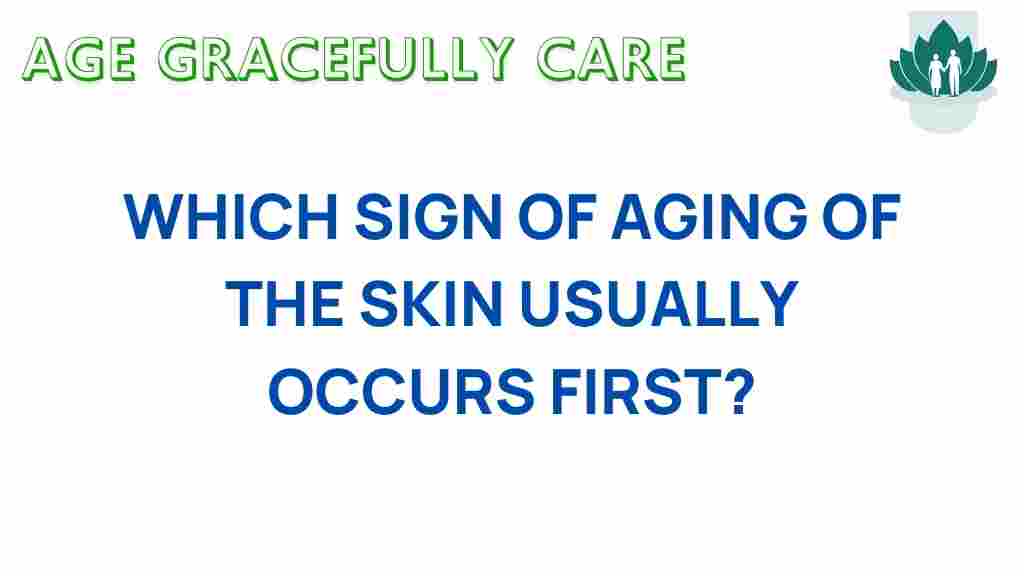Unveiling the First Signs of Skin Aging: What to Expect
As we age, our skin undergoes various changes that signify the natural process of skin aging. Understanding these changes is crucial not only for awareness but also for implementing effective skincare routines that can help in the prevention of premature aging. In this article, we will explore the first signs of skin aging, including the emergence of fine lines, wrinkles, and the impact of collagen loss. We will also discuss how to age gracefully through proper skincare and dermatological advice.
The Process of Skin Aging
Skin aging is a complex process influenced by both intrinsic (genetic) and extrinsic (environmental) factors. As we age, the skin’s structure begins to change significantly:
- Collagen Loss: Collagen is a vital protein that helps maintain the skin’s firmness and elasticity. As we reach our late 20s to early 30s, collagen production starts to decline, leading to sagging skin and the development of fine lines.
- Reduced Elasticity: The skin loses its ability to bounce back, leading to a more aged appearance.
- Decreased Hydration: The skin becomes drier due to reduced oil production, making it more prone to wrinkles.
- Sun Damage: Prolonged sun exposure can accelerate skin aging, contributing to wrinkles, age spots, and a leathery texture.
First Signs of Skin Aging
Recognizing the first signs of skin aging is essential for timely intervention. Here are the common indicators:
- Fine Lines: These are often the first signs of skin aging, typically appearing around the eyes (crow’s feet) and mouth.
- Wrinkles: Deeper creases develop over time, particularly on areas exposed to the sun.
- Loss of Volume: The cheeks may begin to sag as fat pads diminish, leading to a less youthful appearance.
- Uneven Skin Tone: Age spots and hyperpigmentation may become more prominent due to sun exposure and hormonal changes.
- Dry, Rough Texture: The skin may feel less smooth as cell turnover slows.
Understanding Collagen Loss
Collagen loss is one of the primary factors in skin aging. With each passing year, our bodies produce less collagen, leading to structural weakening of the skin. Here’s how collagen loss affects skin health:
- Reduced Firmness: Without sufficient collagen, the skin loses its firmness, making it appear saggy.
- Increased Wrinkles: As collagen diminishes, wrinkles become more pronounced and harder to ignore.
- Slower Healing: The skin’s ability to repair itself diminishes, leading to prolonged recovery from injuries and blemishes.
Skincare for Preventing Skin Aging
Preventing skin aging is possible with a dedicated skincare routine. Here are some essential steps:
- Hydration: Use moisturizers that contain hyaluronic acid to maintain skin hydration.
- Sun Protection: Apply a broad-spectrum sunscreen daily, even on cloudy days, to protect against UV damage.
- Retinoids: Incorporate retinoids into your skincare regimen to promote cell turnover and collagen production.
- Antioxidants: Use serums with vitamin C to combat free radicals and brighten the skin.
- Regular Exfoliation: Exfoliate regularly to remove dead skin cells and improve skin texture.
Professional Dermatology Solutions
For those looking for more intensive treatments, consulting with a dermatologist can provide tailored solutions. Here are some common dermatological treatments for skin aging:
- Chemical Peels: These treatments can improve skin texture and tone by removing the outer layer of dead skin.
- Microdermabrasion: This procedure exfoliates the skin, promoting new cell growth.
- Botox and Fillers: Non-surgical options to reduce the appearance of fine lines and restore volume.
- Laser Treatments: These can target pigmentation and stimulate collagen production.
Tips for Aging Gracefully
Aging gracefully involves more than just skincare. Here are additional tips to consider:
- Healthy Diet: Consume a balanced diet rich in fruits, vegetables, and healthy fats to nourish your skin from within.
- Hydration: Drink plenty of water to keep your skin hydrated and flush out toxins.
- Regular Exercise: Exercise boosts circulation, promoting healthier skin.
- Stress Management: Practice stress-reducing activities like yoga or meditation to improve overall well-being.
Troubleshooting Common Skin Aging Concerns
As you implement your skincare routine, you may encounter some common issues. Here’s how to troubleshoot:
- Dryness: If your skin feels dry despite moisturizing, consider switching to a cream-based moisturizer or adding a hydrating serum.
- Breakouts: Introduce products gradually to avoid overwhelming your skin. If breakouts persist, consult a dermatologist.
- Skin Irritation: If you experience irritation, discontinue the use of harsh products and opt for gentle formulas.
Conclusion
Understanding the first signs of skin aging is crucial for taking proactive measures to maintain youthful skin. From recognizing the role of collagen loss to establishing a robust skincare regimen, the journey towards aging gracefully begins with education and action. By incorporating healthy habits and utilizing effective skincare products, you can minimize the effects of aging and keep your skin looking vibrant.
Remember, it’s never too early or too late to start caring for your skin. For more detailed information on professional treatments, check out this resource. For personalized advice, consider contacting a qualified dermatologist who can guide you on the best practices tailored to your skin type and needs.
Invest in your skin today for a radiant tomorrow!
This article is in the category Wellness and created by AgeGracefullyCare Team
